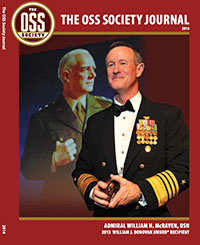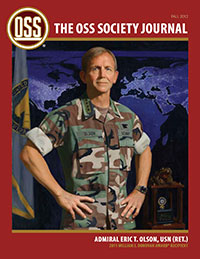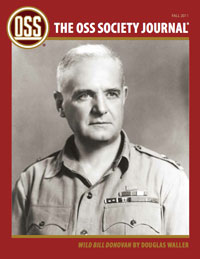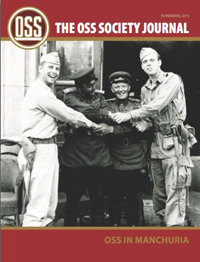The Mighty Wurlitzer: How the CIA Played America
April 2008 Author:Dan Pinck
By Hugh Wilford
Harvard University Press, 342 pages
Reviewed by Dan Pinck
Mr. Wilford’s book is a surgical incision into the intelligence life of Frank Gardner Wisner, a preeminent cold warrior who served in the operational cockpit of our international attempts to rollback the spread of communism. That we achieved our goal is due in part to many of the schemes and strategies developed and set in motion by Mr. Wisner and his colleagues at the CIA. He took risks and made mistakes that come with the territory. If we intend to praise him, we should praise ourselves. If we care to heap calumny on him for his mistakes, we should blame ourselves. If a person is involved in operations and doesn’t take risks and doesn’t make mistakes, that person is not doing his or her job. (Inevitably, some mistakes are inexcusable.)
As there are no easy answers, there are no easy questions. In framing my review or observations, I would like to ask Frank Wisner what he thinks of this book. My feeling is that he would give it a High Pass; in fact, he would commend it for limning the major points in his career and especially the influence of his mentor, George F. Kennan, the principal architect of our earliest Cold War strategies and tactics. And I’d like to contemplate whether Mr. Wisner, had he lived a life almost as long as Mr. Kennan, who died in 2005 at age 101 and who retained his mental sharpness and severe skepticism until the end and repudiated some of his earliest assumptions, -- whether Mr. Wisner would have changed his bedrock outlook on containing communism. I’d like to think he would have changed some of the tunes that he played on his Mighty Wurlitzer. Mr. Wisner called his covert operation a Mighty Wurlitzer on which he could play any propaganda or operational tune.
Harvard University Press, 342 pages
Reviewed by Dan Pinck
Mr. Wilford’s book is a surgical incision into the intelligence life of Frank Gardner Wisner, a preeminent cold warrior who served in the operational cockpit of our international attempts to rollback the spread of communism. That we achieved our goal is due in part to many of the schemes and strategies developed and set in motion by Mr. Wisner and his colleagues at the CIA. He took risks and made mistakes that come with the territory. If we intend to praise him, we should praise ourselves. If we care to heap calumny on him for his mistakes, we should blame ourselves. If a person is involved in operations and doesn’t take risks and doesn’t make mistakes, that person is not doing his or her job. (Inevitably, some mistakes are inexcusable.)
As there are no easy answers, there are no easy questions. In framing my review or observations, I would like to ask Frank Wisner what he thinks of this book. My feeling is that he would give it a High Pass; in fact, he would commend it for limning the major points in his career and especially the influence of his mentor, George F. Kennan, the principal architect of our earliest Cold War strategies and tactics. And I’d like to contemplate whether Mr. Wisner, had he lived a life almost as long as Mr. Kennan, who died in 2005 at age 101 and who retained his mental sharpness and severe skepticism until the end and repudiated some of his earliest assumptions, -- whether Mr. Wisner would have changed his bedrock outlook on containing communism. I’d like to think he would have changed some of the tunes that he played on his Mighty Wurlitzer. Mr. Wisner called his covert operation a Mighty Wurlitzer on which he could play any propaganda or operational tune.
Imagine that Mr. Wisner at age thirty-eight being charged by George Kennan “with the task of breaking up the Soviet Empire.” Mr. Wisner was gung-ho. In 1949, his Office of Policy Coordination made its first attempt to overthrow a foreign government, the communist regime of Albanian dictator Never Hoxha. It was a total failure. The British traitor Kim Philby was the Washington liaison between the Office of Policy Coordination and MI6; he gave the information to the Soviets and all of our agents were killed by Hoxha’s men. Further infiltrations were made in the Baltic States and the Ukraine, with the same results. Covert action continued. Mr. Wilford notes that “... Eisenhower and John Foster Dulles believed clandestine foreign interventions to be a relatively inexpensive, and conveniently deniable, means of waging the Cold War.” You can’t blame Frank Wisner for that; part of his job description was to take the blame. Then and now, the President is actually the CEO of the CIA. The Director of Central Intelligence is, in reality, the Chief Operating Officer.
Do we know beyond a doubt that he was responsible for the overthrow of Mohammad Mossedagh in Iran; that he was responsible for the recruitment of former members of the Nazi Party to help us in covert operations against the Soviet Union? Do we know for certain that he and Allen Dulles tried to upend American democracy by creating an imposing number of fronts and by persuading influential American newspaper publishers, editors and journalists to feed information to the CIA and to prevent damaging information from being printed in their publications? Do we know that the CIA supported or infiltrated a number of magazines in our country and in Germany and Great Britain? Do we know that his office was responsible for recruiting a variety of academic departments to support the training of foreign nationals and, through varied fronts, to entice students, labor unions and religious organizations, including the International Catholic Youth Federation and the Young Women’s Christian Association (for heaven’s sake), museum directors, including the New York Museum of Modern Art, the National Association for the Advancement of Colored People, the Boston Symphony Orchestra (for gosh sakes), the American Society of African Culture, and a host of other organizations? Do we know that he supported the Harvard University International Affairs Committee and Center for International Studies at the Massachusetts Institute of Technology? Relying on primary sources and some recently declassified material, Mr. Wilford assures us that this information is not a fable. Maybe the President of the United States was the instigator. Who knows or will ever know? Maybe it was George Kennan. I’m reluctant to put the finger on Frank Wisner.
Maybe this is not as outlandish as it sounds. Willi Munzenberg, a German citizen born in Prussia and a Marxist intellectual, was one of the most imaginative communist agents ever. Beginning in 1917, he composed score and the play book for what became the CIA’s Mighty Wurlitzer. He knew how to reach the minds and hearts of people through a myriad of fronts that concealed the fact that they were unknowingly supporting the Russian State. He used psychology before there was psychology to capture the minds of the enemy; he did it brilliantly. Mr. Wilford quotes from a biography of Munzenberg titled The Red Millionaire: “Out of these early efforts grew the so-called Munzenberg trust, a vast media of newspapers, publishing houses, movie houses, and theaters which, ‘on paper at least,’ stretched from Berlin ‘to Paris to London to New York to Hollywood to Shanghai to Delhi.” Devices such as this were used by Munzenberg who called them front committees. His operations were picked up by Kennan, a student of Russian history. The Mighty Wurlitzer had its genesis in the Soviet Union. Wisner, partly with Kennan’s guidance, adapted the scheme for his own purposes.
Mr. Wilford’s index is tantalizing. It invites our interest and suggests that if spend the time to decode it, we might deduce the substance and flair undertaken in his research and the breadth of his own investigative skill. We can follow it for fun as well as our asking the question: Was everyone in the CIA or used, without their knowledge, by the CIA? And how many were pawns or dupes of Soviet fronts, again without their knowledge? Some persons mentioned are: Vladimir Nabokov, Jerry Lewis, Dean Martin, F. O. Matthiessen, John Crowe Ransom, Georgia O’Keefe, George Orwell, Jackson Pollack, Elmore Schwartz, Stephen Spender, Gertrude Stein, John Wayne, Arthur Hayes Sulzberger, De Witt Wallace, Ernest Hemingway, Clement Greenberg, Lionel Hampton, James Cagney, Aaron Copeland, Isaiah Berlin, and many others. In a sense, some of these persons reflect the propaganda and scope of the front games of the CIA and the Soviet Union. Of course, the implications of the domestic Wurlitzer were anything but fun and games.
In addition to innumerable front groups, including student associations and labor unions, some of which reached around the world, from Harvard to Europe and Africa. Mr. Wisner recruited more than 450 journalists and writers on our leading newspapers, magazines, and left-leaning periodicals to provide the CIA with information – you can call it spying in many instances – about people and organizations in the United States and in other nations; and, in addition, co-opting them to go easy on writing and publishing incriminating articles about the CIA’s operations. The publisher of The New York Times, Arthur Hayes Sulzberger, a friend of Allen Dulles, played ball with the CIA. A few journalists were repelled by the invitation to become secret agents and they rejected the CIA’s invitation. In effect, Mr. Wisner waged a total Cold War at home and abroad. When many of his operations were exposed, the CIA was almost wrecked.
Strangely, we know more about the personal lives of others than we do about Frank Wisner. Allen Dulles’s photograph is on the cover of the book, not Frank Wisner’s. We learn this about Dulles: “The eve of World War II found Dulles as genial and raffish as ever (qualities that apparently made him irresistible to women – his sexual conquests, in addition to his long-suffering wife Clover, included the queen (sic) of Greece, a daughter of Toscanini, and Clare Booth Luce) but drifting professionally.” Aw shucks.
Frank Gardner Winsor: Born in Mississippi in 1910, died in Maryland in 1965. The bare bones of his existence barely serve as an introduction to posterity. His intelligence career – at least those parts of it that set off firecrackers – is mentioned in many books about the CIA. But none, so far as I know, reveal what kind of a person he was. It seems that the good that he did was interred at his death. Yes, in my opinion, he must have had many commendable, personal qualities; and in his professional life, I feel that he must have made distinguished contributions. All I do know is that he had a few outstanding persons who worked closely with him and achieved well-deserved prominence in our society after they left the CIA. That book has yet to be written. In the meanwhile, we accept Mr. Wilford’s insightful, well-written and modestly-told accounting of an important segment of Wisner’s professional career. Mr. Wilford writes clearly and without the inbred pomposity of so many popular historians and journalists. Frank Wisner played a major role in the Cold War and he’s worthy of Mr. Wilford’s attention and of ours.
Mr. Wilford is a leading historian of the Cold War. Among his other books are The C. I. A., the British Left, and the Cold War (2003); and is the editor, with Helen Laville, of The U. S. Government, Citizen Groups, and the Cold War: The State-Private Network (2006). He is a member of the Total Cold War Roundtable. If he degrades Major General William J. Donovan’s contribution in his new book – well, that’s to be expected; in three books by British historians that I’ve read in the past few months, the writers slam General Donovan and his career in intelligence. I’ve a suspicion of the genesis of this condemnation, but I won’t mention it here.
The interest and outcry against our own intelligence system that began with the expose in Ramparts magazine in 1966 of the CIA and its Mighty Wurlitzer surpasses our interest in, and our outcry against, foreign intelligence operation. This continues today. With Slam Dunk, we moved from skepticism to cynicism.
P. S. We won the Cold War.
Do we know beyond a doubt that he was responsible for the overthrow of Mohammad Mossedagh in Iran; that he was responsible for the recruitment of former members of the Nazi Party to help us in covert operations against the Soviet Union? Do we know for certain that he and Allen Dulles tried to upend American democracy by creating an imposing number of fronts and by persuading influential American newspaper publishers, editors and journalists to feed information to the CIA and to prevent damaging information from being printed in their publications? Do we know that the CIA supported or infiltrated a number of magazines in our country and in Germany and Great Britain? Do we know that his office was responsible for recruiting a variety of academic departments to support the training of foreign nationals and, through varied fronts, to entice students, labor unions and religious organizations, including the International Catholic Youth Federation and the Young Women’s Christian Association (for heaven’s sake), museum directors, including the New York Museum of Modern Art, the National Association for the Advancement of Colored People, the Boston Symphony Orchestra (for gosh sakes), the American Society of African Culture, and a host of other organizations? Do we know that he supported the Harvard University International Affairs Committee and Center for International Studies at the Massachusetts Institute of Technology? Relying on primary sources and some recently declassified material, Mr. Wilford assures us that this information is not a fable. Maybe the President of the United States was the instigator. Who knows or will ever know? Maybe it was George Kennan. I’m reluctant to put the finger on Frank Wisner.
Maybe this is not as outlandish as it sounds. Willi Munzenberg, a German citizen born in Prussia and a Marxist intellectual, was one of the most imaginative communist agents ever. Beginning in 1917, he composed score and the play book for what became the CIA’s Mighty Wurlitzer. He knew how to reach the minds and hearts of people through a myriad of fronts that concealed the fact that they were unknowingly supporting the Russian State. He used psychology before there was psychology to capture the minds of the enemy; he did it brilliantly. Mr. Wilford quotes from a biography of Munzenberg titled The Red Millionaire: “Out of these early efforts grew the so-called Munzenberg trust, a vast media of newspapers, publishing houses, movie houses, and theaters which, ‘on paper at least,’ stretched from Berlin ‘to Paris to London to New York to Hollywood to Shanghai to Delhi.” Devices such as this were used by Munzenberg who called them front committees. His operations were picked up by Kennan, a student of Russian history. The Mighty Wurlitzer had its genesis in the Soviet Union. Wisner, partly with Kennan’s guidance, adapted the scheme for his own purposes.
Mr. Wilford’s index is tantalizing. It invites our interest and suggests that if spend the time to decode it, we might deduce the substance and flair undertaken in his research and the breadth of his own investigative skill. We can follow it for fun as well as our asking the question: Was everyone in the CIA or used, without their knowledge, by the CIA? And how many were pawns or dupes of Soviet fronts, again without their knowledge? Some persons mentioned are: Vladimir Nabokov, Jerry Lewis, Dean Martin, F. O. Matthiessen, John Crowe Ransom, Georgia O’Keefe, George Orwell, Jackson Pollack, Elmore Schwartz, Stephen Spender, Gertrude Stein, John Wayne, Arthur Hayes Sulzberger, De Witt Wallace, Ernest Hemingway, Clement Greenberg, Lionel Hampton, James Cagney, Aaron Copeland, Isaiah Berlin, and many others. In a sense, some of these persons reflect the propaganda and scope of the front games of the CIA and the Soviet Union. Of course, the implications of the domestic Wurlitzer were anything but fun and games.
In addition to innumerable front groups, including student associations and labor unions, some of which reached around the world, from Harvard to Europe and Africa. Mr. Wisner recruited more than 450 journalists and writers on our leading newspapers, magazines, and left-leaning periodicals to provide the CIA with information – you can call it spying in many instances – about people and organizations in the United States and in other nations; and, in addition, co-opting them to go easy on writing and publishing incriminating articles about the CIA’s operations. The publisher of The New York Times, Arthur Hayes Sulzberger, a friend of Allen Dulles, played ball with the CIA. A few journalists were repelled by the invitation to become secret agents and they rejected the CIA’s invitation. In effect, Mr. Wisner waged a total Cold War at home and abroad. When many of his operations were exposed, the CIA was almost wrecked.
Strangely, we know more about the personal lives of others than we do about Frank Wisner. Allen Dulles’s photograph is on the cover of the book, not Frank Wisner’s. We learn this about Dulles: “The eve of World War II found Dulles as genial and raffish as ever (qualities that apparently made him irresistible to women – his sexual conquests, in addition to his long-suffering wife Clover, included the queen (sic) of Greece, a daughter of Toscanini, and Clare Booth Luce) but drifting professionally.” Aw shucks.
Frank Gardner Winsor: Born in Mississippi in 1910, died in Maryland in 1965. The bare bones of his existence barely serve as an introduction to posterity. His intelligence career – at least those parts of it that set off firecrackers – is mentioned in many books about the CIA. But none, so far as I know, reveal what kind of a person he was. It seems that the good that he did was interred at his death. Yes, in my opinion, he must have had many commendable, personal qualities; and in his professional life, I feel that he must have made distinguished contributions. All I do know is that he had a few outstanding persons who worked closely with him and achieved well-deserved prominence in our society after they left the CIA. That book has yet to be written. In the meanwhile, we accept Mr. Wilford’s insightful, well-written and modestly-told accounting of an important segment of Wisner’s professional career. Mr. Wilford writes clearly and without the inbred pomposity of so many popular historians and journalists. Frank Wisner played a major role in the Cold War and he’s worthy of Mr. Wilford’s attention and of ours.
Mr. Wilford is a leading historian of the Cold War. Among his other books are The C. I. A., the British Left, and the Cold War (2003); and is the editor, with Helen Laville, of The U. S. Government, Citizen Groups, and the Cold War: The State-Private Network (2006). He is a member of the Total Cold War Roundtable. If he degrades Major General William J. Donovan’s contribution in his new book – well, that’s to be expected; in three books by British historians that I’ve read in the past few months, the writers slam General Donovan and his career in intelligence. I’ve a suspicion of the genesis of this condemnation, but I won’t mention it here.
The interest and outcry against our own intelligence system that began with the expose in Ramparts magazine in 1966 of the CIA and its Mighty Wurlitzer surpasses our interest in, and our outcry against, foreign intelligence operation. This continues today. With Slam Dunk, we moved from skepticism to cynicism.
P. S. We won the Cold War.







